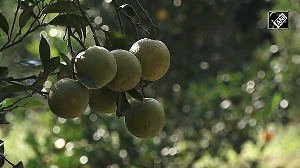Over 40 countries have committed to provide India urgently-required medical supplies like oxygen-related equipment and critical medicines to help it deal with an unprecedented second wave of the coronavirus pandemic, Foreign Secretary Harsh Vardhan Shringla said on Thursday.

At a media briefing, he said India is looking at getting in the immediate future around 550 oxygen-generating plants, 4,000 oxygen concentrators, over 10,000 oxygen cylinders and 17 cryogenic oxygen tanks, some of which have already arrived.
"We are facing an unprecedented second wave of the pandemic. As of now, we have over three million active cases. This has obviously put considerable pressure on our healthcare system; on the capacities and resources that we have," he said.
Shringla said India was at the forefront of generating the consciousness that the pandemic cannot be dealt with by individual countries and that a collective approach was required to contain it.
"They are extending support as they feel that this is the time we must help India. 'India has helped us and we must help India'. So I do not think we are looking at it in policy terms," the foreign secretary said.
"We are looking at it in terms of a situation that is very very unusual, that is very unprecedented, that is very exceptional and we will do whatever it takes to meet the requirements of our people at this point of time," he added.
At the media briefing, Shringla said India had supplied essential pharmaceutical products including hydroxychloroquine, paracetamol and even Remdesivir to geographies across the globe in view of the pandemic and the countries have now come forward to help India.
His response came to questions on whether there was a shift in India's policy of not accepting foreign aid that was enunciated after the 2004 tsunami.
"We have given assistance; we are getting assistance. It shows an interdependent world. It shows a world that is working with each other," Shringla said.
Shringla said the government, in many senses, has been very quick to try and make an assessment of where it has capacity shortfall and based on some of these considerations, the ministry of external affairs has been trying to find the most effective means of addressing the resource constraints.
Late last night, External Affairs Minister S Jaishankar had a video conference with the Indian heads of missions all over the world to apprise them about the domestic requirements in view of the situation, he said.
Shringla said certain areas were prioritised which included procurement of liquid oxygen as well as equipment that produces oxygen, oxygen generators, oxygen concentrators, transportation equipment for oxygen.
He said there has been an outpouring of solidarity and assistance to India.
"Over 40 countries have actually committed to provide us with many of the items that we need urgently," he said.
The foreign secretary also said that India is looking at procuring 400,000 units of antiviral medication Remdesivir from Egypt besides attempting to get it from countries like the United Arab Emirates, Bangladesh and Uzbekistan.
"International cooperation is a very vital part of our meeting and bridging the immediate requirements that we have. Obviously we are making every effort to step up our own capacities," he added.
The foreign secretary also said that India was looking at procuring ready-to-use coronavirus vaccines considering the huge domestic requirement.
"It is an interdependent world where we have given and we are taking also. Vaccine has to be seen in the context of international cooperation," he said.
Pharma major Gilead Sciences has already offered India 450,000 doses of Remdesivir while the government is looking at getting around 300,000 doses of Favipiravir from Russia and the UAE.
Shringla said Indian missions abroad, particularly those in the countries that have the capacity to meet India's requirement, have been told to work towards sourcing the supplies.
He mentioned that India has been manufacturing 67,000 units of Remdesivir per day against a daily requirement of 200,000 to 300,000 doses a day, adding efforts are on to ramp up the production to 300,000 to 400,000 doses a day.
India has been given assurance of required supply of raw materials for ramping up production of Remdesivir by Gilead Sciences.
Shringla said three special flights from the US are expected to bring large medical supplies including oxygen generating equipment and oxygen concentrators. Two flights are expected to arrive on Friday while the third one is set to come on May 3.
The US supplies will include 2,000 oxygen concentrators, 500 oxygen cylinders and equipment for providing 28 million litres of oxygen, he said.
The MEA has been coordinating with various other concerned ministries and agencies to expedite clearances and to ensure the medical supplies are delivered to those who needed them the most.
"We want to make the process smooth right from the point we identify the sources of supply to the point that it actually reaches those who want them," Shringla said, adding the MEA has attached "greatest importance" to this effort.
"We are working extensively to ensure that the entire cooperation and coordination that we need with all our international partners and interlocutors all over the world is smoothly interfaced with our domestic requirement," he said.
Asked about assistance from China, Shringla said some of the procurement is coming from China.
Sources said India is making only commercial procurement from that country.











 © 2025
© 2025